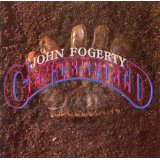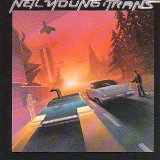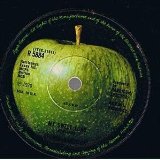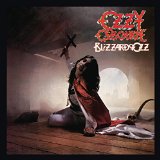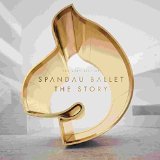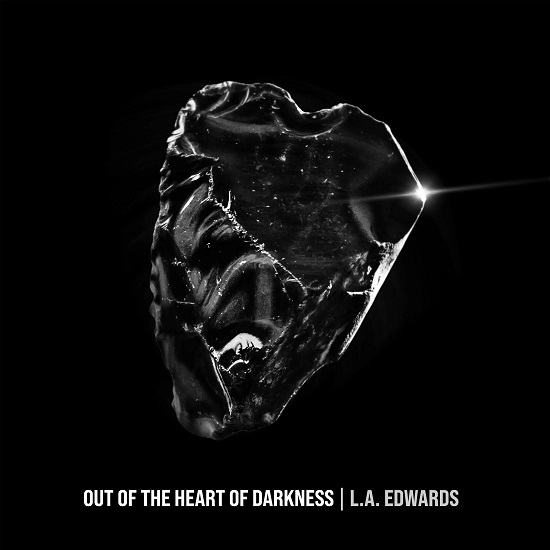
Imagine driving along the freeway in the early eighties. The sun’s shining, the roof’s down and the radio’s tuned to the local FM station. You could be listening to any song from the L.A. (Luke Andrew) Edwards album ‘Out of the Heart of Darkness’. Unfortunately the press pack didn’t come with a time machine, so it was a Skoda on the A12 but at least the sun co-operated. The album’s packed with nine classic FM style rock songs influenced by the bands of the late seventies and the early eighties mixed with Luke Edwards’ acoustic folk roots to create a widescreen sound that’s difficult to resist.
The album starts with a haunting spoken intro from a child in some sort of distress before launching into ‘Little Boy Blue’ which opens with the album’s trademark jangling guitars overlaid with a synth line. The chiming guitars, harking back to Tom Petty, The Byrds and even the Mersey Sound are a constant throughout the album and L.A.’s slightly nasal intonation emphasises the Tom Petty connection (his first solo album was produced by former Heartbreaker Ron Blair) and there are hints of other influences as well. Creedence Clearwater Revival and the Laurel Canyon groups; Neil Young, Eagles and so on, but there are a few surprises as well.
Most of the musical stylings are standard rock band arrangements (drums, bass, guitars and keys) but there are a few surprises as well. ‘Already Gone’ (not an Eagles cover) begins with a swirling Wurlitzer prelude before the sticks click and the band blasts into the song. There’s a good use of dynamics throughout the album as songs build up gradually and there are plenty of breakdowns to vary the tempo and power. ‘Stick to You’ is another interesting blend of styles, combining L.A.’s earlier folk roots with rock instrumentation and some tribal floor toms to create something that edges into Waterboys territory.
There’s plenty of novelty in the combinations of styles across the album, but there are a few of the old tricks as well including the squalling feedback intro on ‘Now You Know’ and the twin lead guitars opening ‘Time to Go’. There’s even the unapologetic drug references of ‘Hi Rite Now’; it’s got all of the ingredients for a classic rock album.
‘Out of the Heart of Darkness’ is released in the UK on Friday June 2nd and the band will be touring the UK and Europe in early July.
Here’s the video for ‘Already Gone’:
 The High Fives feature just wouldn’t be the same without a contribution from Our Friend in the North. Steve J has been a very busy man this year, reviewing loads of gigs for us while working as a radio presenter in the Peak District and somehow manging to publish a couple of books as well, “On the Radio” with his brother Paul and a solo effort, “Rock ‘n’ Roll Twilight”. They’re both cracking reads (subtle stocking-filler hint here) and our totally unbiased view is that you should get hold of a copy of each for your nearest and dearest. In the meantime, here’s Steve’s reaction to hearing some of his classic 45s (ask your nan) performed live.
The High Fives feature just wouldn’t be the same without a contribution from Our Friend in the North. Steve J has been a very busy man this year, reviewing loads of gigs for us while working as a radio presenter in the Peak District and somehow manging to publish a couple of books as well, “On the Radio” with his brother Paul and a solo effort, “Rock ‘n’ Roll Twilight”. They’re both cracking reads (subtle stocking-filler hint here) and our totally unbiased view is that you should get hold of a copy of each for your nearest and dearest. In the meantime, here’s Steve’s reaction to hearing some of his classic 45s (ask your nan) performed live.
High Fives. This year has been the year of classic singles – LIVE!! So I’ve picked my fave live performances of five classic singles that I’ve experienced this year, bookending from ‘I’m Not In Love’ to ‘Is This Love?’ See what he did there? Certainty into uncertainty. Metaphor for the year, n’est-ce pas?
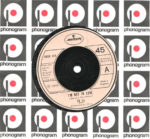 “I’m Not in Love” – 10CC
“I’m Not in Love” – 10CC
A beige, plastic-labelled 45 on Mercury Records. A night out at The Opera House in Buxton. Nearing the end of a storming set and the lighting changes. Suddenly, I become aware of an effect which has been more or less redundant all night…a cutaway mirrorball, throwing darts of seventiesesque silver light in elderly lovers’ eyes and randomly piercing the sudden dark blue wash which had swallowed the stage. And with stunning clarity and instant recognition, the keyboard strikes up for one of the most perfect, flawless and in a way, perplexing lurv songs of all time. And it’s all there. The ambiguity in the title, suggesting despair or disdain or something in between (Disappointment? Disenchantment? Take a look into this lovely audio mirror; see what bounces back) and all wrapped up in that rich electric keyboard swirl which at times sounds like it is emerging, dripping, from between the trees. And can the CCs pull off the stunning build up of layer upon layer of vocal harmonics before it all dissipates in a crystalline sprinkle of sparkly synth? Sure can. Sure do. Four or so minutes of suspended animation. Perfect.
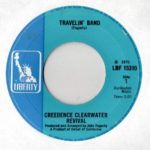 Travellin’ Band – John Fogerty / Creedence Clearwater Revival
Travellin’ Band – John Fogerty / Creedence Clearwater Revival
Ain’t nothing fancy about this; a UK-release blue-labelled Liberty Records mono 45 cut like the San Andreas Fault and heavily worn with spiral striations due to jukebox wear (the arm skims the toast rack of records, reaches down, grabs, makes a wear imprint and over time, your 45 will fade from shiny black to shimmering grey) with a stomped-out middle and a triangular black centre piece. And a night out in the former Millennium Dome in London. But what a way to start a set. This ain’t no polite calling card; this is a ‘blow the doors off’ statement of intent. John Fogerty rips into the opening tune with the ferocity of a storm-force wind. Rasping and what even for then was uncompromisingly ‘dated’ sax gives way to the foghorn honk of Fogerty’s amazing vocal. You can read millions of pages about what it was like to live the rock ‘n’ roll lifestyle; or you can listen to this for about two minutes twenty seconds and get the whole story. You’ve paid for it. And you’re having it.
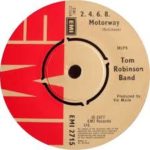 2-4-6-8 Motorway” – Tom Robinson Band
2-4-6-8 Motorway” – Tom Robinson Band
Red and salmon pink-labelled EMI demo 45 stamped ‘Factory Copy; For Demonstration Use Only’. And as tended to happen with the ‘airplay’ samples, it’s a Porky Prime Cut alright, tyre-wall black and uncompromisingly deep. Wherever it plays, it cuts the air like a knife. Pop tune meets rock anthem meets The New Wave (sort of). Probably the most out of context of all TRB’s output (with the exception of a few plain duffers on the second album) it is the Show Closer all century long, ensuring an enthusiastic crowd stick around for the encore and are Up For It. As a song it just screams to be hit hard, and sung with lust for life and played with drive and passion. And at Shepherd’s Bush Empire, that’s what it gets as the Tom Robinson Band roll back the years and suddenly we’re all somewhere else, sometime else.
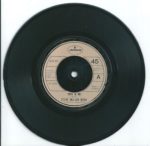 “Rock ‘n’ Me” – Steve Miller Band
“Rock ‘n’ Me” – Steve Miller Band
Another beige plastic-labelled Mercury Records 45. Another drivetime classic meets live anthem. But this one is very ‘American’ as we return to the Drearydomeydrome, London, once more. This just ‘drives’ along on vinyl, with the singer’s voice sounding as artificial and as ethereal as Fogerty’s is to sound ‘real’ and very much Of This World about half an hour later, same place, same night. This is as much a tribute to the fine art of producing recorded sound as it is to it being a mighty fine, well-arranged song. And after an early evening where the sound sold Steve Miller and the Millermen seriously short, it was good to hear the whole thing come together and produce three minutes of unadulterated joy, which evoked top-down, hedonistic, Californian sunshine of various kinds just as vivaciously as the little unassuming vinyl disc did when it first lit up my grim Scottish tenement flat as I first played a demo copy to myself on a horrible little autochange record player way back in (I think!) 1976. Keep On Rockin’ Me, Baby.
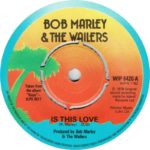 “Is This Love” – The Wailers / Bob Marley and the Wailers
“Is This Love” – The Wailers / Bob Marley and the Wailers
Island records multi-coloured label 45 with the lurid green palm tree in the foreground, and with the centre knocked out for use as a Jukebox copy, my “Is This Love?” is a well-travelled audio file. I’ve taken it out on more gigs than The Beatles, The Stones and The Who have played put together and sure enough it bears all the scars of wear, tear, spilt beer, exposure to sunshine on outdoor gigs, grit in between the single sleeve sides, greasy buffet fingers and sub-zero storage. Old-school DJ abuse, in short. As do The Wailers, who continue unsteadily but utterly charmingly into the future, carrying Bob Marley’s live legacy with them. Both on the 45 and in the Manchester Academy, the song and the way it is delivered contains enough space to walk around in. Space. Clarity. No clutter. And those chord progressions and the odd squirt of squealing lead guitar every now and then. And that drummer. Live, just as on the record, strolling, loping along as if it’s the easiest, most natural thing on earth. (Try it some time! I stand in awe of most musicians due to my own limited abilities but reggae drummers….well.) On stage as on vinyl, sunshine, but more than that, a hope bordering on a belief that love can indeed triumph over all, and that peace will be the outcome and unity will be the end result; which lasted about as long as it took for me to walk outside into the typecast Manchester rain and for some bloke half my age and twice my size to attempt to kick me swede in whilst waiting for a taxi. And the compliments of the High Fives to you, too.
It’s time to move away from albums, gigs and photos for a while and take a look at some of the music-themed books that have kept me sane on buses, trains and planes during 2015. By sheer chance, I’ve managed to pick out quite a nice variety of styles and themes, so the selection staggers from light-hearted memoirs through serious autobiography to high technology and serious crime (no, I don’t mean the new Coldplay album). So, as ever, in no particular order, here we go.
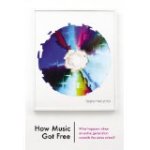 “How Music Got Free” – Stephen Witt
“How Music Got Free” – Stephen Witt
There’s a myth that’s been perpetuated about the origins of the current situation where we have a generation that won’t pay for music and a generation that doesn’t even recognise the concept of paying for music. What Stephen Witt’s book achieves is a comprehensive demolition of the myth that file-sharing came about because of some sort of people’s revolution where millions of like-minded people decided to share their digital music collections. This well-researched work picks out the various converging paths ultimately leading to the digital devaluation of music. The book explores the bureaucracy that bedevilled the adoption of a standard compression algorithm, the greed of the major music labels as they rushed into the highly lucrative CD market, the failure of the majors to react to the phenomenon of file compression (and increasing online transfer speeds which made sharing a viable proposition) and the outright criminality involved in stealing and counterfeiting masters from CD pressing plants. It’s a fascinating but ultimately depressing book.
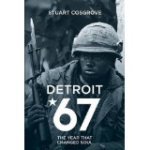 “Detroit 67: The Year that Changed Soul” – Stuart Cosgrove
“Detroit 67: The Year that Changed Soul” – Stuart Cosgrove
Stuart Cosgrove has picked out a pivotal year in the history of Motown and imposed a structure of a chapter per month (it works pretty well) which sets the upheavals at Motown against a backdrop of riots in Detriot, unrest in the police force and a general national malaise. Berry Gordy plays a central role in the well-known story of Diana Ross’s advancement at the expense of the other Supremes (and the expulsion of Florence Ballard), but Stuart Cosgrove delves deeper into the sickness at the heart of the company, dealing with the unease of major artists and the ultimate defection of the Holland/Dozier/Holland writing/production team. The book goes far beyond music biography by showing these events in the context of a city in meltdown with riots on either side of the racial divide and a brutal, corrupt police force fanning the flames. It’s a fascinating read, although there are far too many typos in the Kindle edition.
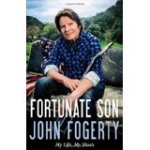 “Fortunate Son” – John Fogerty
“Fortunate Son” – John Fogerty
Confession time: the first song I performed in public was Creedence’s “Up Around the Bend” in a school band which included some good musicians and a future nuclear physicist, and me. I was a fan from an early age. “Fortunate Son” is John Fogerty’s attempt to put the record straight after accusations and counter-accusations, suits and counter-suits with his former band members Doug Clifford and Stu Cook. The book is unflinchingly honest throughout; John Fogerty isn’t trying a whitewash here. He owns up to his mistakes and errors of judgement and this gives him the right to expose others’ lies and hypocrisy. It’s difficult not to empathise with him in his battles with Saul Zaentz and the former Creedence members: he wrote the songs, after all. “Fortunate Son” pivots around John Fogerty’s meeting with his second wife, Julie, who brought order to his chaotic life and pushed him back towards popular and critical recognition. It’s good, it’s honest, it’s straightforward and it’s delivered in an authentic John Fogerty voice.
 “Unfaithful Music and Disappearing Ink” – Elvis Costello
“Unfaithful Music and Disappearing Ink” – Elvis Costello
Declan McManus has an awful lot of stories to tell and, not surprisingly, he has a gift for writing and storytelling. “Unfaithful Music…” is a cracking read, giving an insight into the creation of some wonderful music, and life in the music business bubble. The book doesn’t follow a straightforward chronological structure; it’s much more like a conversation in the pub with each observation triggering another digression. There are some difficult events to deal with (the Stephen Stills/Ray Charles incident for example) and they’re all dealt with in a very matter of fact way. The book skips over some big chunks of Elvis Costello’s life, but the ones he does tackle are done with honesty and candour. The names that crop up as the story unfolds are a history of popular music, but this never feels like name-dropping, they’re just people who happen to have been around at certain times. This is a wonderful book.
“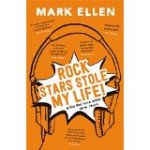 Rock Stars Stole My Life” – Mark Ellen
Rock Stars Stole My Life” – Mark Ellen
Mark Ellen’s memoir is a breezy and self-deprecating run through a life as a pop journalist, radio presenter, TV presenter and publisher. He gives an inside view on life at the NME in the seventies, The Old Grey Whistle Test and the Live Aid broadcast, all delivered in a jaunty style that’s very easy to read. He’s met and worked with some amazing people (again, it’s all matter-of-fact rather than name-dropping), but being a member of Ugly Rumours with Tony Blair takes some beating. Most of the book is fairly gentle humour, smiles rather than guffaws, but Mark Ellen saved the best for last. His account of the mayhem aboard Rihanna’s ill-conceived and farcical round-the-world-in-seven-days tour made me laugh out loud. The entire book’s funny, but this piece was hilarious.
If you don’t see anything you fancy there, Chrissie Hynde’s “Reckless” and Bob Harris’s “Still Whispering After All These Years” are both well-written and interesting biographies.
Please tell me it hasn’t come round again already; drunks on public transport, pubs packed with once-a-year drinkers and a demand from MusicRiot to cobble something together for their inane end of year feature. Damn, Christmas again and I hate Christmas unless I can sack a widow on Christmas Eve. But wait, I can see a chink of gloom poking through the bright lights; it looks like John Fogerty and Creedence Clearwater Revisited are opening legal hostilities again, so I think a festive five music lawsuits is about as much fun as I can hope for.
The man in the lumberjack shirt and his CCR ex-buddies are kicking legal lumps out of each other again and nobody really knows what it’s all about, but there are plenty of lawyers involved and onstage pronouncements and press conferences and a whole flamin’ media circus. Just bear this in mind guys; whoever wins, all the lawyers get paid.
But that’s not the most interesting lawsuit John Fogerty has been involved in, oh no. He sold the rights to his songs to his former label Fantasy (headed by the infamous Saul Zaentz) to escape from label (don’t try that one at home boys and girls) and go solo. So, Mr Fogerty gets a bunch of songs together and releases the album “Centerfield”. Happy ending; not quite. The litigious Mr Zaentz sues on the grounds that the album’s opening song, “The Old Man down the Road” plagiarises a Creedence song, “Run Through the Jungle”, which Zaentz holds the copyright for. He wasn’t too chuffed about the song “Zanz Kant Danz” (later changed to “Vanz Kant Danz”) either. So what could be more stupid than suing someone (unsuccessfully) for copying their own song?
Well, David Geffen had a pretty good shot at it in 1983 with Neil Young when he sued him for not sounding like his previous records. After signing one of the most contrary artists in rock (or maybe just a guy who follows his own artistic vision), he decided, after three albums he didn’t like, to sue Shakey for submitting ‘uncharacteristic’ music for release. Maybe it was a bit of a coincidence that the albums weren’t selling. You have to wonder where David Geffen had been living during the seventies if he hadn’t realised that Neil Young didn’t give a stuff about following commercial trends. They eventually kissed and made up and Shakey went back to his spiritual home at Reprise records.
So that’s one case of a label suing an artist for sounding too much like themselves and another case of a label suing an artist for not sounding like themselves. Where else can the stupidity go? Well, back in time a decade or so.
After the Beatles, the quiet one was quickly out of the blocks with the triple album “All Things Must Pass” and the single “My Sweet Lord”. Three weeks after the release of the single, George was hit with a lawsuit alleging that the single plagiarised the Chiffons single, “He’s So Fine” (big in the US, not so big in the UK). It took five years for the case to come to court and George was found guilty of “subconscious plagiarism”, which cost him over half a million dollars. What you have to ask is how come no-on spotted this similarity? “All Things Must Pass” was co-produced by Phil Spector, who was very much part of the American teen scene in 1963 when “He’s So Fine” was a hit. It’s hard to believe he couldn’t spot such an obvious similarity. So, how many more ways could lawyers invent to make money out of the music business. How about “Where there’s blame there’s a claim”?
Jumping back to the eighties again, in 1988 the parents of a teenage fan tried to accuse Ozzy Osbourne of causing the death of their son, claiming that hidden lyrics in “Suicide Solution” had caused their son to take his own life; the suit was dismissed but it didn’t mean that the suicide blame game was over. In 1990, Judas Priest were taken to court by the parents of two teenagers who, after a drugs and alcohol binge, attempted a suicide pact. It’s interesting that no-one was trying to sue any brewers, distillers or dealers for their part in the events. Just ask yourself again who benefitted from these legal cases; I’ll give you a clue, it wasn’t the parents or the bands. Ok, it’s Christmas, let’s try to end on a slightly happy note.
It all started off so well; a bunch of school friends got together and formed a band in the seventies. The band caught the New Romantic zeitgeist with their first single in 1980 and everything was looking good; who needed lawyers and contracts? Well, in this case it might have been a good idea (I never said I had to be consistent) because any memories of verbal agreements vanished after the band became famous. In 1990, Tony Hadley, Steve Norman and John Keeble sued for a share of the booty, claiming that their contributions and a verbal agreement entitled them to a twelfth of the royalties. The case was dismissed and the non-Kemp Spandaus faced huge legal bills, but that wasn’t the end of the affair.
In 2009, the guys resolved their legal issues and got back together to tour again as Spandau Ballet; well, it is Christmas and we should have a happy ending really. There’s a lesson there as well; at this time of year, everyone goes to the pub and maybe that’s what the Spandaus and all of the other people mentioned here should have done. Forget all of the lawyers, go and have a few beers and sort all of your problems out.
Merry Xmas.
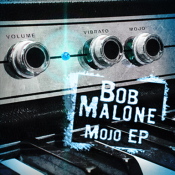 Bob Malone’s one of those musicians that you know you’ve heard about, but you’re not sure where or when; it didn’t take long to find out. Just have a look at his Wikipedia entry for a start. He played keyboards on five songs on one of my favourite albums of 2014, John Fogerty’s “Wrote a Song for Everyone”, and that’s a pretty good recommendation. He’s also a singer, songwriter and arranger who has already released six albums and “Mojo EP” is a UK-only sampler for his upcoming album “Mojo Deluxe”.
Bob Malone’s one of those musicians that you know you’ve heard about, but you’re not sure where or when; it didn’t take long to find out. Just have a look at his Wikipedia entry for a start. He played keyboards on five songs on one of my favourite albums of 2014, John Fogerty’s “Wrote a Song for Everyone”, and that’s a pretty good recommendation. He’s also a singer, songwriter and arranger who has already released six albums and “Mojo EP” is a UK-only sampler for his upcoming album “Mojo Deluxe”.
With a pedigree like that, you would expect the playing on the EP to be high quality and you won’t be disappointed. With support from Mike Baird (drums), Jeff Dean (bass) and Bob DeMarco (guitars) and a few guest appearances, the playing and arrangements are always on the money. Bob’s voice is perfectly suited to the styles and songs on the EP. He can power out the rock and blues in a raucous style, but also sounds totally convincing on the slower songs, particularly the gospel/blues cover of the Ray Charles song “Hard Times”.
The first track on the EP, the stomping “A Certain Distance”, pulls you in with an electric piano riff and pumping, mainly root-note bass to drive the song along, and it’s one of a couple of songs that explore the gap between musicians (and maybe creative artists generally) and the rest of the world. The brooding, menacing “Toxic Love” is a slow blues which builds slowly from a foundation of bass and drums by adding layers of slide, guitar and keyboards to create a swampy, bayou feel with a hint of early Creedence Clearwater Revival. “I’m Not Fine” is the second of the songs that deal lyrically with the role of the professional musician and the artificial bonhomie of the music business, and it’s boosted by some fine unison guitar and keyboard playing plus some powerful backing vocals from Lavone Seetal and Sarah Nolan.
The ballad “Paris” turns the old romantic cliché on its head as the beauties of the city are listed but can’t compare with being back home with the one you love; it’s a nice sentiment but, after rejecting one cliché, it reinforces another by introducing an accordion to create a Parisian ambience. The final track, “Rage and Cigarettes”, is a warning about the dangers of becoming embittered by allowing circumstances to take control of you, rather than the opposite, and it’s pulled along nicely by an overdriven five note slide guitar hook and a melodic bass line; this is one that you just know you want to hear live.
Bob Malone has brewed up a heady mixture of rock, blues and New Orleans soul over the years and “Mojo EP” is a perfect sampler for the upcoming “Mojo DeLuxe” album. If you want to see him live, you can find his UK tour dates for the next four weeks here. We’ll see you at the final show in Southend.
“Mojo EP” is out on 01 September 2014 on Delta Moon Records (DMR 007).
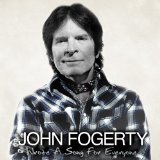 So, what’s this all about then? John Fogerty, former Creedence Clearwater Revival frontman and highly respected solo artist has decided to revisit some of his back catalogue with a few collaborators and throw in a brace of new songs for good measure. It’s not a new idea and it can be either a cynical attempt to cash in on a few good, old songs or a chance to invite fellow musicians to put their stamp on your songs. I’m really pleased to say that “Wrote a Song for Everyone” is a fascinating look at the heritage of one of the great rock songwriters and performers. You have to approach this with an open mind; some of the songs, in their original incarnations, were massive teenage favourites of mine through happy and sad times but there are some radically different interpretations here. The conventional view is that Eagles popularised the country-rock genre, but you could make the same case for Creedence if you take your country influences from New Orleans rather than Bakersfield; just a thought.
So, what’s this all about then? John Fogerty, former Creedence Clearwater Revival frontman and highly respected solo artist has decided to revisit some of his back catalogue with a few collaborators and throw in a brace of new songs for good measure. It’s not a new idea and it can be either a cynical attempt to cash in on a few good, old songs or a chance to invite fellow musicians to put their stamp on your songs. I’m really pleased to say that “Wrote a Song for Everyone” is a fascinating look at the heritage of one of the great rock songwriters and performers. You have to approach this with an open mind; some of the songs, in their original incarnations, were massive teenage favourites of mine through happy and sad times but there are some radically different interpretations here. The conventional view is that Eagles popularised the country-rock genre, but you could make the same case for Creedence if you take your country influences from New Orleans rather than Bakersfield; just a thought.
The album opens with “Fortunate Son”, which is amped-up by the Foo Fighters to a full-on rocker (no surprise there) before Keith Urban delivers a banjo-led country-rock version of “Almost Saturday Night” which takes the song back to its lyrical roots and “Lodi” (probably my favourite John Fogerty song) gets the Status Quo “Rocking All Over the World” treatment with John’s two sons Shane and Tyler Fogerty. Incidentally, this is the only collaboration that Fogerty arranged, pulling rank with his two sons when he didn’t like their country-rock arrangement. “Mystic Highway” is one of the new songs and breaks down into 3 sections, the main song, an instrumental section and an a capella breakdown with a strong feel of the Doobie Brothers “Black Water”. “Wrote a Song for Everyone” features a Miranda Lambert vocal and some exceptional guitar work from Tom Morello; so far so good.
The Zac Brown Band reworking of “Bad Moon Rising” in a Cajun style works less well for me, losing the brooding menace of the original version. “Long as I can See the Light” with My Morning Jacket sticks fairly close to the original, retaining the organ riff which characterises that version and is followed by Kid Rock’s take on “Born on the Bayou”. Apparently it’s now a violation of several federal statutes to record a collaboration album without including a Kid Rock track. The album’s second new song “Train of Fools” follows, exploring similar territory to Springsteen’s recent “Land of Hope and Dreams”. It’s obvious that John Fogerty can still write a good song and the new songs sit very comfortably alongside his earlier work on this album.
“Someday Never Comes” with Dawes has Taylor Goldsmith singing the verses about the things we tell kids (and adults) to shut them up while Fogerty takes the choruses as the gruff old bad guy who tells us that it’s all lies. Bob Seger delivers the Woodstock song “Who’ll Stop the Rain” very much in the style of his 1976 classic “Night Moves”, which works very well. If any singles are to be released from the album, “Hot Rod Heart” should be top of the list. It’s a great driving song (maybe it’s time we had an alternative to the lazy radio programming of Don Henley’s “The Boys of Summer” every time the sun shines for more than five minutes) and the last couple of minutes consists of Fogerty and Brad Paisley trading superb guitar solos and generally having a good time. I bet Paddy McAloon wouldn’t like it.
“Have You Ever Seen the Rain” with Alan Jackson works perfectly with a pure country arrangement with banjo, fiddle and steel guitar filling out the sound and leads us into the last track of the album. I’ve heard many versions of “Proud Mary”, but nothing quite like this. The first verse and chorus are pure gospel with Jennifer Hudson backed by a gospel choir and the wonderful Allen Toussaint before speeding up to a Cajun boogie with the full band and accordion and horns for good measure. I used to think the Ike & Tina Turner version was over the top, but they only used one kitchen sink and I think there’s about three here. It’s a glorious way to end a great album.
John Fogerty has survived in the music business for a long time with all of the usual peaks and troughs that anyone big in the sixties and seventies went through including the publishing disputes, particularly the publishing disputes. The reason he’s still around is that he loves what he does and he’s very good at it. “Wrote a Song for Everyone” is a very, very good album.
Out now on Vanguard (88765487152).


